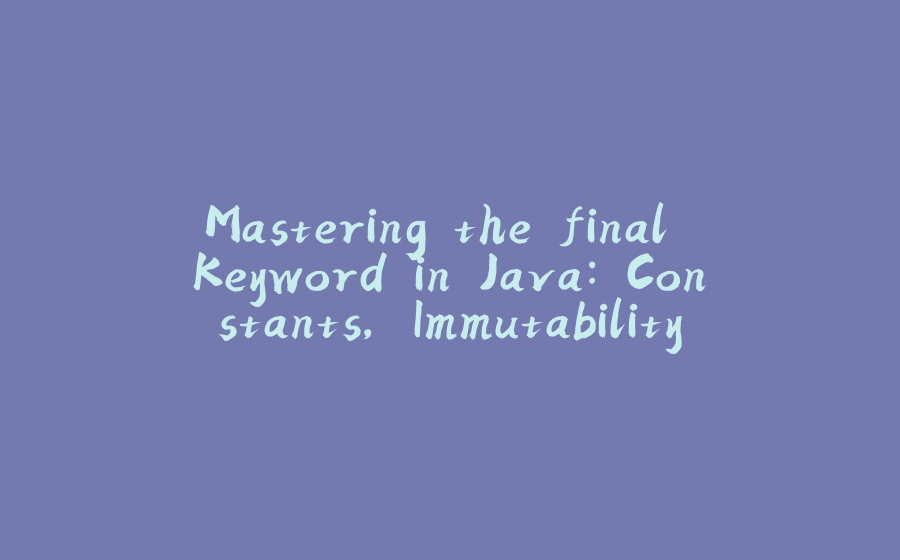Java Keywords Essentials (7 Part Series)
1 Mastering THIS Keyword in Java: A Key to Clean and Effective Code
2 Mastering SUPER Keyword in Java: Unlocking Inheritance and Constructor Chaining
… 3 more parts…
3 Mastering the final Keyword in Java: Constants, Immutability, and More
4 Static Keyword: Decoding Static Blocks in Java
5 Static Keyword: Decoding Static Variables in Java
6 Static Keyword: Accessing Static and Non-Static Members in Methods
7 Static Keyword: Overloading, Overriding, and the Role of this and super
The final keyword is one of the most fundamental tools for creating constants and ensuring immutability in Java. However, it’s more than just declaring variables that can’t change. In this post, we’ll explore the key aspects of the final keyword in different contexts and its impact on variables, static fields, and constructors.
1. Final with Variables
Using final with variables ensures that once a value is assigned, it cannot be changed later. Here’s a quick breakdown:
- Constant Naming Convention: Use UPPERCASE names (e.g.,
COUNT). - Initialization Requirements: Must be initialized either at declaration or in constructor.
- All Constructors Must Initialize: If initialized in the constructor, every constructor must assign a value.
- No Setters: Setters cannot be generated for
finalvariables since they’re immutable.
final int COUNT;
final char GENDER = 'F'; // Initialized at declaration
public FinalKeyword() {
// Initialized in Constructor
COUNT = 90;
// This will give a compile error
// once initialized during declaration, cannot be changed
GENDER = 'M';
}
Enter fullscreen mode Exit fullscreen mode
In the example above:
-
COUNTis not initialized at the time of declaration, meaning it must be initialized in the constructor. -
GENDERis initialized with'F'and cannot be changed anywhere else.
2. Final with Static Variables
A static final variable must be initialized at the time of declaration or in a static block. Unlike instance variables, static final fields cannot be initialized in the constructor because:
- Static variables belong to the class, not to individual instances.
- Final enforces immutability, meaning their values cannot be modified, even by instances.
static final int ID = 1;
static final int DEPT;
static {
DEPT = 90; // Initialized in static block
}
Enter fullscreen mode Exit fullscreen mode
Why Can’t Static Final Variables Be Initialized in Constructors?
Since constructors are called when instances are created, and static variables are associated with the class (not instances), it’s not possible to initialize or modify them inside a constructor.
3. Static Variables vs Static Final Variables
Static variables without final can be modified even inside constructors.
static int salary; // Default value 0 at class loading
public FinalKeyword() {
salary = 10; // Static variable modified in constructor
}
Enter fullscreen mode Exit fullscreen mode
Key Differences
- Static variables are shared across instances and can be modified by any of them.
- Static final variables are immutable and shared by all instances, ensuring they remain constant throughout the program.
4. Constructor Requirements for Final Variables
When a final variable is not initialized at the time of declaration, it must be initialized in all constructors to avoid a compile-time error.
public FinalKeyword() {
COUNT = 90; // Initialized in default constructor
}
public FinalKeyword(int count) {
COUNT = count; // Initialized in parameterized constructor
}
Enter fullscreen mode Exit fullscreen mode
If a constructor does not initialize a final variable, the compiler will throw an error, ensuring the value is always assigned exactly once.
4. Comparison of Final Keyword Usage in Methods and Classes
| Usage | Effect | Example |
|---|---|---|
| Final Method | Cannot be overridden in subclasses. | public final void getType() in java.lang.Object |
| Final Class | Cannot be inherited by any class. | java.lang.String, java.lang.Math |
- Final Methods: A
finalmethod ensures that subclasses cannot override it, enforcing consistent behavior across all instances. This is useful for methods likegetType()inObject, which ensures critical functionality is not altered.
- Final Classes: Declaring a class as
final(e.g.,StringorMath) ensures that no subclass can alter its behavior, maintaining data integrity and preventing misuse.
Conclusion
The final keyword is a powerful tool in Java to enforce immutability and prevent unintended modifications. It plays a crucial role in defining constants, ensuring class-level consistency, and making code easier to understand and maintain.
Stay tuned for other posts in this series, where we’ll cover more Java keywords in depth to help you master the nuances of the language!
Related Posts
Happy Coding!
Java Keywords Essentials (7 Part Series)
1 Mastering THIS Keyword in Java: A Key to Clean and Effective Code
2 Mastering SUPER Keyword in Java: Unlocking Inheritance and Constructor Chaining
… 3 more parts…
3 Mastering the final Keyword in Java: Constants, Immutability, and More
4 Static Keyword: Decoding Static Blocks in Java
5 Static Keyword: Decoding Static Variables in Java
6 Static Keyword: Accessing Static and Non-Static Members in Methods
7 Static Keyword: Overloading, Overriding, and the Role of this and super
原文链接:Mastering the final Keyword in Java: Constants, Immutability, and More


























暂无评论内容